- Home
- James Y. Bartlett
Death is a Two-Stroke Penalty Page 2
Death is a Two-Stroke Penalty Read online
Page 2
I sighed again. I seemed to be doing a lot of sighing these days. As I started across the parking lot, I almost crossed into the path of a bright red Pontiac Fiero that was accelerating quickly. He squealed his brakes at the same instant that I stopped short. Not a real close call, but I felt the adrenaline rush. I smiled and waved him on.
The driver leaned out his window. He was wearing a golf shirt with purplish horizontal stripes.
“Gosh, I’m real sorry,” he called out. “We were talking and I wasn’t paying attention.”
“No problem,” I said. “No blood, no foul.” As he rolled past, I caught a glimpse of tawny brown legs in the passenger seat, encased in a very short red mini, and a flash of mirrored sunglasses held in long cool fingers. As he turned down the drive, I saw her profile through the window: soft brown, shoulder-length hair framed a lovely face. Long lashes, pouty lips, perky nose.
It was just a glimpse, just a fragment. But I knew that John Turnbull was driving away with a very pretty girl.
Chapter 2
THE ONGOING CIRCUS that is the PGA Tour quietly folded its tents in Atlanta and moved on to the next stop: the Cannon Carolinas Open in Charleston, S.C.
I caught a late-night plane that bounded on thunderheads all the way down to Charleston. Monday morning, I woke up in a standard-issue hotel room, either a Sheraton, a Hilton or
a Holiday Inn. It took three cups of coffee in the coffee shop before I remembered where I was. Checking out, I climbed into my rented box sedan (either a Ford, a Chevy or a Buick) and set out in the early morning haze.
I followed U.S. 17 out of the city and up over the Cooper River. From the peak of the huge silver bridge, the view of the busy industrial port below was impressive. Far off in the haze, I could just make out the shape of Fort Sumter, guarding the entrance to the harbor.
Down off the bridge, I followed the road over to Mt. Pleasant, then across Shem Creek to the Isle of Palms. For two hundred years, the elite residents of Charleston had summered on Isle of Palms, escaping the closed-in, river-fed humidity of the city for the sun-baked, marsh-fed humidity of the island and its miles of beach. But Isle of Palms had none of the appearance of a well-heeled retreat for the elite. Most of the island was filled with beach shacks selling inflatable floats, T-shirts, sunglasses, flip-flops and Cokes, and everyone I saw walking along the streets was wearing a bathing suit or torn-off jeans. Arrogantly shabby, they called it. Summer slums.
I left the Isle behind and followed the road out along the ocean to Wappoo Island. Huge live oaks framed the roadside, their limbs creating a green canopy draped with gray Spanish moss. The road twisted through the heart of the island, yielding occasional glimpses of salt marsh on either side. There were few homes out here, just the odd tarpaper shack or double-wide trailer surrounded by rusty machinery of various kinds, pecking chickens and several small black children who paused in their play to watch with wide eyes as I drove past.
This was the real Low Country. Two hundred and fifty years ago, this land had been actively cultivated by English colonists. The hot sun and rain-freshened humidity had been perfect for growing cotton and corn and indigo plants for making dyes. To work in this decidedly non-British climate, the growers had imported slaves from Africa. Over many generations, these Africans had acclimated themselves to the Low Country life; the hard, hot, back-breaking work in the fields. They had even developed a unique language of their own, the strange-sounding Gullah tongue, an amalgamation of partly remembered African words and eighteenth century English.
The boll weevil and the Civil War had ended the system of plantation life. But the people, the black people, had remained on the land for generation after generation. They continued to scratch out a living as best they could, coaxing crops out of the sandy soil, fishing and crabbing in the tidal creeks. Poor? Yes, in terms of annual dollars earned, these people are among the poorest in the country. But in terms of connection with the life of the past, of who they are who they were, they are among the richest on the earth.
I knew, from my previous visits, that some of these ebony- skinned people, the old ones, still spoke Gullah to each other. To a stranger, especially a white-skinned stranger, they would lapse into Southern black shuck-n-jive. “Yassah, no’m, uhhh-huhhh, you know thass right.” But to each other, suddenly, they would rattle off those harsh-sounding, guttural syllables that sound like no other language you’ve ever heard.
And the old ones, in whose eyes you can observe the passing of the countless years, in whose lined and leathered faces you saw etched the hardships of decades of July midday sun and cold January nights... these old ones still hung on to their beliefs in voodoo and magic and spirits. Many still painted the trim on their houses a cheerful blue color. ‘Haint blue. Designed to keep the Evil One away from the door. The Low Country is filled with acres of empty pastures and spooky woods. With ancient old oaks whose twisted limbs can conjure up any number of scary things when the sun goes down, and the moon rises gold on a warm wind, and the owls and other night creatures begin their strange and haunting sounds.
Finally, as the road neared the ocean again, I passed through an elegant brick and wrought-iron gate. “Welcome to Seagrape,” read the sign. The roadbed was now bordered by manicured grass sculpted into mounds and broken by colorful flower beds. At the security gate, the smiling guard came out of his hut, gave me a snappy three-fingered salute and directions to the tournament’s media center. He didn’t ask me if I was a Libyan terrorist bent of destroying his coastal resort, but then, they never do.
As I drove through the resort on my way to the golf course, I mentally wrote the glossy, four-color brochure for the place. It’s a bad habit we writers have.
Bring your entire family to experience the Seagrape life, I wrote to myself. Just minutes from historic downtown Charleston. More like an hour and half, but who’s counting? You’ll love the peace and quiet of this isolated island environment. Which means twenty minutes each way to drive back into Isle of Palms for a gallon of milk and a magazine. Relax in pampered luxury, far away from the troubles and cares of your workaday world. Two bedrooms, two baths, no daily maid service, bad reception on the TV. Take advantage of all the amenities Seagrape has to offer you and your family. Everything at premium prices, from golf to tennis to bike rentals. You even have to pay for a beach umbrella and chair. But then again, if you have to ask how much things are here, you’re probably in the wrong place. Enjoy the restful views of the marshes and lagoons of beautiful Wappoo Island. But watch out for the billions of mosquitos and no-see-ums that breed there.
I stopped copywriting when I pulled into the parking lot of the Bohicket Country Club, Seagrape’s golf course. One could not be sarcastic about this facility. The land where the island came to a point between the open ocean and the marshes was truly remarkable. Some geological quirk had created a high bluff at the end of the island, with sand dunes cascading down to the surf on one side, and thick vegetation crowding up to the eternal salt marshes on the other. In South Florida, they would have built a twenty-story high-rise or three on this land, selling eight or nine hundred units for two million bucks each. But the land here cried out for a golf cou7rse and the developers of Seagrape had wisely listened.
Bohicket’s front nine flirted with the marshes and wrapped itself around the huge old oaks of the island’s interior. Deep black lagoons created daunting hazards for the golfers. But the back nine at Bohicket had earned the course its national reputation. The holes frolicked on the unique topography of the island like dolphins at play. Up, down, and over the central sandy ridge, down along the shore, the green fairways had been built to resemble breaking waves. Greens were tucked next to windblown dunes, guarded by deep pot bunkers. Here there were no trees, and the unchecked ocean winds whistled across the course. The deep green of the grass painted a striking contrast to the monochromatic tones of beach grass and scrub pines and sand. It was a wild and beautiful place and though a decade old, it looked as though golf had b
een played here for centuries.
I went through the familiar ritual of picking up my press credentials from Suzy in the pressroom. She had my packet ready: final list of the players who were exempt and playing, plus those who either qualified for a spot in the week’s field, or had been granted a sponsor’s exemption. Suzy’s list also included the players who were not playing this week. My packet had the Thursday morning pairings and tee times, and updated statistics through the Atlanta tournament. I had to choke down my weekly burst of irritation when I reviewed the stats list. The PGA Tour, a bastion of modern-day capitalism, has sold out for sponsor dollars everywhere it can, including the list of statistics. To make matters worse, individual companies and organizations paid for each of the categories. So I had to wade through the Merrill Lynch Money Leaders, the Daytona Berach Sand Saves, the Texaco Long Drive Leaders, and the Soft Touch Putting Leaders, among others. Seething, I ended up throwing the whole mess in the trash.
I saved only my map of Seagrape and my room key. One good thing about this weekend’s tournament was that the resort offered a ready supply of nice accommodations for the players, the press and tournament VIPs. All four hundred or so condominiums at Seagrape had long been sold to wealthy businessmen from the East and Midwest. These gentlemen had the privilege of actually staying in their condo units for two weeks a year. The other fifty weeks, the unit was placed in the rental pool and leased to paying guests. On average, they rented each unit between twenty-five and thirty weeks a year. After deducting maintenance, management, taxes and other fees, each owner would take a very nice cash loss. Fully deductible. It made their accountants very happy. The American Way.
The press room was deserted on a Monday. Four of my colleagues were involved in a gin game at the back of the room. The Fourth Estate is ever vigilant. Suzy was hanging players’ names on the scoreboard that had again been installed to cover one entire wall. Facing the scoreboard were five rows of low white tables on which sat various computers, laptops and telephones. A long table along one wall held a bank of fax machines and a copier. The back of the room had been set off with a fabric room divider, and behind that was the press cafeteria, where we all went for free food.
I staked out a corner as my office for the week, left my stuff there and went outside.
Monday is always a quiet day. The top-name pros are off doing their clinics and outings, or spending a couple days at home with the wife and kids. For the not-so-top players, Mondays are work-out-the-kinks days. Golf may be a game, but playing on tour is hard work. The practice tee, off in the distance, looked busy. I wandered over to the putting green and found a dozen players sweating in the hot midday sun while they worked on their putting strokes. There was an air of quiet concentration. One player had outlined a rectangle with white tees jabbed in the turf and was working on keeping his putterhead within the box as he stroked the ball. Another had ten balls in front of him and mechanically stroked them at the hole ten feet away. His caddie squatted behind the hole, catching the balls one by one. After all ten had been putted, the caddie rolled them all back, one by one. They did this over and over again, not speaking a word to each other. Other players stood around in groups of two or three, comparing grips, trying each other’s putters, discussing life. At the far end of the green, I saw John Turnbull talking with another man. Third time’s a charm, I thought, and headed over.
“Hey John,” I said cheerily, “Run over any sportswriters lately?”
He looked at me, recognized me, smiled and blushed. “Hey Mr. Hacker,” he said, shaking my hand. “Naw, haven’t had any more in my sights. Real sorry about that.”
I shook my head and glanced at the man standing next to him.
“Do you know Ed?” Turnbull asked. “Ed, this is Pete Hacker. Brother Ed Burkee.”
Brother Ed was a small man with a soft look about him. He was dressed in black slacks and a black, long-sleeved shirt which served to accentuate his pasty white skin tones. You could tell he was an indoor type. His hand, which I shook, was thick and soft and moist and he didn’t really shake, he let his hand get pumped weakly up and down by mine. But the man’s face was arresting. His thick, jet black hair was swept back dramatically from his forehead, creating something of a pompadour in front before plastering down in back. And his eyes were almost as black, sharply piercing and set deeply into his rigid and unsmiling face.
I knew the name. Brother Ed Durkee had become the unofficial chaplain to the players on the Tour. While he did not attend every tournament, he showed up frequently to hold Bible study classes, informal chapel services and to talk with and counsel some of the players. I remembered that John Turnbull had been one of those players who professed to have been “born again” and was a regular at Brother Ed’s classes.
“Tending to your flock this week, holiness?” I said to him jokingly. His deep black eyes peered back. He didn’t smile.
Turnbull chuckled. “C’mon, Hacker, knock it off.” He looked at Brother Ed. “You know how these sportswriter guys are, Ed,” he said.
“’Even in laughter, the heart is sorrowful,’” Durkee intoned in his best religious-ese.
“Amen,” I said. “St. Paul to the Ephesians?”
“Solomon to the Jews,” Durkee responded. “It’s from Proverbs.” Then he actually smiled at me.
I relaxed a bit. A smiling padre is always better than an unsmiling one. Hacker’s First Rule of Religion.
“How many guys are in your ... er ... do we call it a congregation?” I said.
“Congregation is fine,” Durkee said. “After all, ‘whenever two or more are gathered in His name—‘ The number grows every year. There are about twenty players who attend Bible study now and we usually expect fifty or more for Sunday chapel. Including wives and children, of course,” he added.
“Of course,” I nodded. “That’s a pretty healthy group.” “Indeed,” Brother Ed said with a satisfied look. “And we expect great things from them. We have big plans for the future, isn’t that right John?” He turned to Turnbull who had been listening and looking as if he wanted to go back to the putting green.
“Uh, right, Ed. That’s right,” he said with a decided undertone of unenthusiam. I looked at him curiously.
“Well,” Durkee said, “I must be off. Nice talking to you,” he nodded at me.
“Right father,” I said. “And remember, ‘Laughter gilds the golden soul.’”
He cocked his head to the side and looked at me with a puzzled expression. “Ecclesiastes?” he finally guessed, sounding very unsure of himself.
“Naw,” I said. “Hacker’s Book of Heathens.”
Turnbull guffawed. Brother Ed glared at me for a long moment, turned on his heel and stalked off. We watched him go.
“Hacker’s Second Rule of Religion: Beware of those who can’t take a joke,” I said. “You’ve been playing pretty good, huh?” I changed the subject before he could ask me what the first rule was.
He looked out over the putting green at the players working on their games. “Yeah,” he said, with a small and satisfied smile. “Winning that first tournament really helped. I’ve been able to relax and have some fun and not worry so much about things. And the ball’s been going about where I want it to, y’know? I’ve always known I could play, but it’s starting to feel like I belong out here, and that’s a great feeling.”
“You got married recently, too, didin’t you?” I asked.
“You’re damn right he did,” said a female voice behind us. We turned together. “Becky,” Turnbull said in a quietly happy way and she came into his arms. By any definition, Becky Turnbull was a stunner. Her blond hair pillowed softly against her shoulders, She raised her face for a kiss and her blue eyes sparkled. She had that California girl look: perfect complexion, perfect style, a perfect package. Yet the package was so obviously upbeat and happy that one had to admire and enjoy it. She was wearing a stylish gray business suit softened by a pink cravat at her throat. Even through the suit you could see the
soft, feminine curves. Most of the players on the putting green stopped their work and looked at Becky Turnbull.
My mind flashed back on that glimpse of woman I had seen in Turnbull’s car the night before. I thought: This isn’t the same one.
Turnbull stopped kissing his wife and introduced us. Her grip was firm and assured. She looked at me with interest. “Oh, Hacker,” she said in recognition. “Are you doing a story on Johnny?”
Turnbull laughed in embarrassment. “Becky,” he chided. I laughed. “Not really, ma’am,” I said with exaggerated politeness. “Just gathering facts for future reference. Deep background, you might say.”
She started to respond, but her eyes suddenly narrowed as she looked over my shoulder. I turned and saw that Brother Ed had returned.
“Excuse me, John,” Brother Ed said, “But I realized that we never resolved that topic we were discussing. I really need to get your thoughts on it before our meeting this week.”
“Well, Ed,” Turnbull started.
“The answer is the same as before,” Becky Turnbull interjected sharply. I looked at her in surprise and saw that her face was flushed angrily. “We do not have enough facts to make an intelligence decision, and we won’t commit to anything until we have those facts.”
Brother Ed Durkee locked eyes with Becky Turnbull. There was a sudden malevolent electricity in the air between them. I could have sowrn I heard thunder crashing in the background.
“I can see this is not a good time to discuss it, John,” Brother Ed said, emphasizing Turnbull’s name. “We’ll talk later.” Once again, he turned on his heel and stalked off.

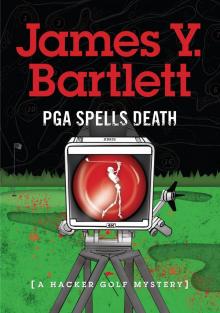 P.G.A. Spells Death
P.G.A. Spells Death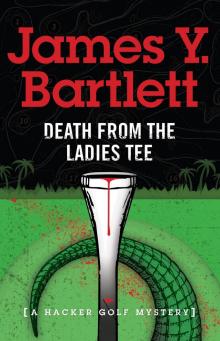 Death from the Ladies Tee
Death from the Ladies Tee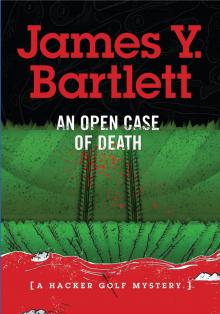 An Open Case of Death
An Open Case of Death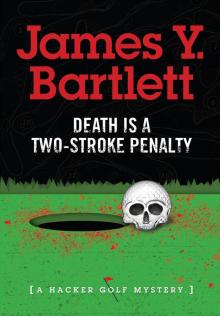 Death is a Two-Stroke Penalty
Death is a Two-Stroke Penalty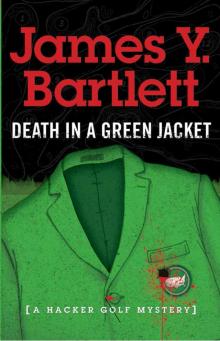 Death in a Green Jacket
Death in a Green Jacket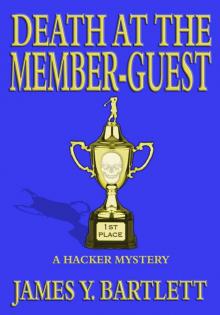 Death at the Member Guest
Death at the Member Guest